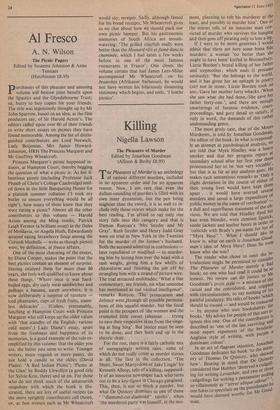Killing
Nigella Lawson
The Pleasures of Murder Edited by Jonathan Goodman (Allison & Busby £8.95)
The Pleasures of Murder is an anthology of various different murders, included in no apparent order and for no apparent reason. Now, I am sure that even the dullest-sounding of murders is filled with its own inner dynamism, but the pen being mightier than the sword, it is as well to in- clude only those stories which make for the best reading. I'm afraid to say only one story falls into this category and that is Damon Runyan's 'Mrs Snyder and Mr Gray'. Ruth Snyder and Henry Judd. Gray were on trial in New York in the Twenties for the murder of the former's husband. Both the accused admitted in confessions later repudiated or modified — to murder- ing him by hitting him over the head with a sash weight, giving him a few whiffs of chloroform and finishing the job off by strangling him with a strand of picture wire. The trial attracted multitudes; 'What a fine commentary, my friends, on what someone has mentioned as our vaulted intelligence', remarks Runyon. The prosecution and defence wentjhrough all possible permuta- tions of this squalid murder, but the focal point is the prospect of 'the woman and the crumpled little corset salesman ... trying to save their respective skins from the singe- ing at Sing Sing'. But justice must be seen to be done, and they both end up in the electric chair.
For the rest, there is a fairly catholic mix of unengagingly written tales, some of which do not really count as murder stories at all. The first in the collection, 'The Short, Sweet Martyrdom of Jake Lingle' by Kenneth Allsop, tells of a killing, supposed- ly of an innocent newspaper hack who turns out to be a key-figure in Chicago gangland. This, then, is not so much a murder, but what De Quincey dismisses as one of those
"diamond-cut-diamond" tussles', when 'the murdered party was himself, at the mo-
ment, planning to rob his murderer at the least, and possibly to murder him'. One of the stories tells of an innocent man con- victed of murder who survives the hanging and then goes off pirating only to lose a leg.
If I were to be more generous I would admit that there are here some bona fide murders: a woman `no better than she ought to have been' knifed in Bloomsbury; Lizzie Borden's brutal killing of her father and stepmother, which ends (I presume seriously): 'But she belongs to the world, and it has given her an epitaph in poetry (sic) not in stone: Lizzie Borden took an axe,/Gave her mother forty whacks./When she saw what she had done,/She gave her father forty-one.', and there are enough smatterings of forensic evidence, court- proceedings, and gory detail to satisfy, if only in word, the demands of this rather undemanding genre.
The most grisly case, that of the Moors
Murderers, is told by Jonathan Goodman, the editor of the book. In what is supposed- ly an attempt at psychological analysis, we are told that Myra Hindley was a heavY smoker and that her progress report at secondary school after her first year there pronounced her to be 'not very sociable', but that is as far as any analysis goes. He makes such sententious remarks as 'Only slight deviation in the course of either of their young lives would have kept them apart ... it would have averted several murders and saved a large expenditure of public money in the name of retribution' — a dull and superfluous statement of the ob- vious. We are told that Hindley dyed her hair even blonder, wore cirmson lipstick, suede jackets and leather boots in order to 'coincide with Brady's pet-name for her of "Myra Hess" '. What I should like to know is, what on earth is Jonathan Good- man's idea of Myra Hess? Does he even know who she was?
The reader who chose to omit the in
troduction might be permitted to consider. The Pleasures of Murder merely a bad book; no one who had read it could be so lenient. No review can do justice to l. M Goodman's prose style — a mixture of the casual and the convoluted, and crippled with circumlocution, to say nothing
which
painful jocularity. He talks of books . should be owned — and would be treasured
s for
— by anyone who uses bookshelves is: books.' My advice for people of this sort ii; ignore this one. One of the contributorsa described as 'one of the last surviving and ed, most expert exponents of the broderi a of Ins Anglaise style of writing, with purple
dominant colour'. Jonathan In an act of flagrant injustice,
Goodman dedicates his book `to the mein ory of Thomas De Quincey,
uincey how'. Bearing in mind that De Q who showed or three
ing for writing Leviathan, and two considered that Hobbes 'deserved a cudgeli so villainously as "terror ubique adera • hment he
cudgellings for writing a pentameter en so one hates to speculate on the punis would have deemed worthy for Mr Good' man.










































 Previous page
Previous page